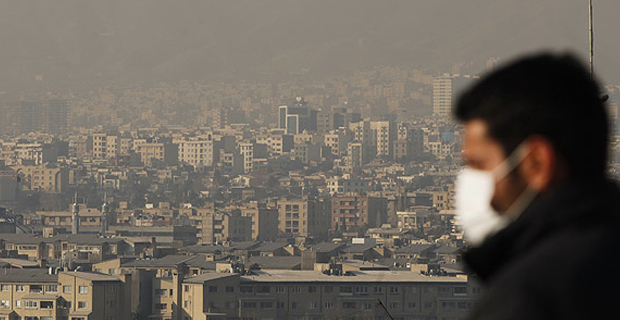Iran sees reduction of air pollution in Tehran

By Sara Rajabova
Iran, which is experiencing some big problems relating to air pollution, is trying to resolve the problems through various ways.
As a result of government's measures to address the problems, air pollution in Iran's capital city Tehran has diminished recently.
Managing Director of the National Iranian Oil Refining and Distribution Company, Abbas Kazemi, said on June 24, the air pollution in Tehran, which reached to an alarming level in previous years, has been significantly reduced, IRNA news agency reported.
Kazemi noted that since the beginning of distribution of high quality Euro-4 gasoline, the air quality of the capital Tehran has improved very much.
Euro 4 is a globally accepted European emission standard for vehicles, which requires fuel with significantly low amounts of sulfur and benzene.
Iranian government has ordered the Oil Ministry to distribute gasoline meeting Euro-4 standard and high quality diesel oil in big cities.
All the gas stations of Iranian capital, Tehran are currently distributing gasoline conforming to Euro-4 standard.
National Iranian Oil Refining and Distribution Company (NIORDC) distributes daily 44 million liters of gasoline and diesel oil conforming Euro-4 standard in the capital.
Besides, distribution of euro-4 gasoline has started in the northwestern city of Tabriz as part of Iran's plan to reduce air pollution in big cities.
Kazemi said Tehran, which is considered the most polluted city of the country, experienced 80 days of unpolluted, seven days of polluted and six days of clean air in the first quarter of the current Iranian year (started March 21, 2014).
He noted that based on a report released by the Department of Environment (DOE), Tehran's air quality improved in the first 70 days of the current year compared to the corresponding period last year.
Environmental experts believe a large part of air pollution in Iran is due to emissions from vehicles using low quality gasoline produced in petrochemical complexes.
Recently, Iranian President Hassan Rouhani blamed choking air pollution in Tehran on gasoline produced by petrochemical plants.
The former government produced gasoline in petrochemical complexes to thwart sanctions imposed on the country, which exacerbated environmental hazards.
Head of the Environmental Protection Organization Massoumeh Ebtekar said in last December that gasoline produced in Iran does not comply with international standards.
Ebtekar accused the government of ex-president Mahmoud Ahmadinejad of failing to meet obligations on fuel standardization.
Iran's Petroleum Minister Bijan Namdar Zanganeh recently ordered petrochemical plants to stop producing gasoline.
Iran had to produce gasoline in petrochemical plants as it faced restrictions in gasoline purchase due to international sanctions imposed on the country over its disputed nuclear program.
In recent years, air pollution in Tehran and other areas including Khuzestan and Isfahan, reached a critical point. Thus, Iran's President Rouhani gave a special directive to address air pollution in Tehran.
The air over Iran's capital is amongst the most polluted in the world, and experts say many Iranians suffer from serious health problems. According to official statistics, currently 12-13 million people reside in Tehran.
The problem of Tehran's air pollution has repeatedly forced the government to declare some days off in the capital due to the high degree of pollution.
Vehicles are the main reason for air pollution in Tehran. Only 40 percent of people in Tehran use public transport, while 60 percent use their personal cars.
Tehran is wedged between two mountains that trap the fumes of its bumper-to-bumper traffic.
Other major Iranian cities also struggle with air pollution on a seasonal basis.
The fact that some big cities like Isfahan, Mashhad, Arak, Karaj, Qom, and Ahvaz are facing a somewhat similar situation backs up this view.
Here we are to serve you with news right now. It does not cost much, but worth your attention.
Choose to support open, independent, quality journalism and subscribe on a monthly basis.
By subscribing to our online newspaper, you can have full digital access to all news, analysis, and much more.
You can also follow AzerNEWS on Twitter @AzerNewsAz or Facebook @AzerNewsNewspaper
Thank you!
